Why Innovation Matters
Prioritizing innovation enables Greif to reduce our footprint and support our customers’ desire for safer, more sustainable products and reduced transportation costs. As we continue to innovate, we advance sustainable packaging and circular economy principles. We analyze our entire value chain—from the extraction of raw materials to our products’ end-of-life—to find opportunities to improve our products and processes. This strategy is not only the right thing to do but provides us a competitive advantage.
Governance
$872 M
Revenue from Sustainability-tagged Products
In 2021, Greif had $872,376,716 in revenue from sustainability-tagged products for Greif's GIP business unit.
Our innovation efforts focus on transforming our product portfolio by developing sustainable packaging solutions based on a set of eight environmental, social and financial sustainability criteria. Through internally-initiated solutions and collaboration with customers, our innovation efforts focus on dematerialization and circularity principles—producing products that are lighter weight, utilize more recycled raw materials and designing for recyclability and circularity—and green material substitution—identifying safer materials to produce our products—while continuing to meet performance requirements. Innovation is managed by our Global Innovation Committee, comprised of representatives from each of Greif’s business units. The committee structure facilitates idea sharing and collaboration across the enterprise. In 2021, the committee standardized procedures so colleagues at every level of the organization have a unified process to share ideas and drive innovation. The committee meets with Greif’s Executive Leadership Team (ELT) quarterly providing progress updates on innovation priorities and industry megatrends that may influence investment and overall company strategy in the future. Our innovation approach evaluates and prioritizes projects based on potential financial return, sustainability impacts and overall value to Greif and our customers. In 2021, Greif had $872,376,716 million in revenue from sustainability-tagged products for Greif’s Global Industrial Packaging (GIP) business unit, including life cycle services.
In 2019, we developed our inaugural “Greif Global Innovation Trends Report” that identified six trends that are strategically relevant to Greif:
- Companies are Becoming More Environmentally Friendly
- Digitization & Automation of Manufacturing
- Digitization of Supply Chain & Logistics
- Digitization of Enterprise Purchasing & Business-to-Business Selling
- Workforce Shortages, Surpluses & Skill Gaps
- Growth Opportunities Increasing in Emerging Markets
The Greif Green Tool continues to be an important tool for us to communicate our innovations and sustainable products to our customers. Since its inception, we have partnered with many of our key global accounts to evaluate the GHG emissions associated with different packaging options, product end-of-life scenarios and transportation options. In 2021 we continued to engage with our customers using the Greif Green Tool providing more complex analyses in support of lowering their carbon footprint through packaging and logistic optimization solutions. In 2022, we will update the tool with our latest product information, ensuring data and product classifications are up to date. As a result of the update, the tool will include more life cycle services, reconditioning and recycling data.
In 2021, we also developed the Greif Green Tool Lite. As our customers continue to set scope 3 targets, the demand for product emissions data has only increased. We designed the Green Tool Lite to provide answers to our customers more quickly. The Greif Green Tool Lite provides carbon footprint and reduction metrics that our customers can achieve by switching to a more sustainable product. Customers can use the tool for our most-sold IBCs and fibre, plastic and steel drum products. We will continue to advance our digital services to provide our customers innovative solutions and the best customer service experience in industrial packaging.
Our innovation priorities vary based on the specific needs of each of our business units and their customers. In 2021, our Global Industrial Packaging (GIP) business continued to institute multiple sustainable product projects to reduce material use, and we will begin to look into zero carbon packaging options. Similarly, our Flexible Products & Services (FPS) business also advanced multiple sustainable product projects to reduce material use that, collectively, are estimated to generate 380 tons of material savings annually. The business unit also worked with our stakeholders to maintain our position as a market leader in food safety and meet emerging compliance requirements as part of our Food Safety Initiative. In 2019, we formalized our integrated ISO-certified food manufacturing practice program, which involves integrating basic food safety procedures into our quality management system. At the end of 2021, 100 percent of our GIP North America facilities were compliant with the new standards.
Our innovation efforts also address regionally specific needs and can go beyond our products. Greif’s Latin American (LATAM) offices are encouraging innovation in their working environment. In 2019, the team began hosting interactive and in-person innovation workshops to teach our colleagues about innovation and brainstorm not just product and process ideas, but innovations we can bring to our working environment to be a better and more attractive employer for current and future colleagues. In 2020, our LATAM team began conducting bi-weekly reviews with members of the innovation team to spread innovative practices that are already in place, identify new innovation opportunities and discuss non-product innovation opportunities to better serve our customers. Through these continued efforts, Greif LATAM developed a facetted side-wall design for lightweight drums and ECOEX jerrycans.
Across our Paper Packaging & Services (PPS) business we work in close collaboration with our customers to develop innovative solutions to meet their performance and sustainability needs. Each month, our core development and strategy team meets to discuss the progress of innovation projects within PPS and take action on any challenges. Quarterly, an innovation team meets to ensure continued progress against our innovation objectives. We continue to develop innovative, recycled material products that replace virgin-based products and remove plastic by incorporating our barrier coatings. Made of recyclable and/or compostable paperboard, our products provide customers with improved end-of-life solutions and advance our circular economy strategy. These products include paperboard for food grade packaging, food service items, beverage carriers and EasyPour® construction cores. By working with our customers to provide sustainable products, we reduced our and our customers’ carbon footprints, enhanced brand value by entering new markets and realized cost savings. PPS commercialized many such sustainable products in 2021 that have replaced over 50,000 tons of single-use plastic packaging and other non-recyclable products.
The COVID-19 pandemic has created challenges globally, but we have adopted new processes and procedures to conduct business efficiently and effectively while protecting the health and safety of our colleagues and partners. We have utilized online platforms to host conferences, virtual tours and forums. We have also held customer webinars to demonstrate changes to our products and processes, our life cycle services, sustainability, our product portfolio and other key topics.
In 2022, we will continue to have innovation at the core of our business practices. We plan to focus on new barrier technologies for plastics, jerrycan designs, PCR products, knock down drum offerings across specific markets in LATAM, anti-counterfeiting measures and Internet of Things technologies. We will also prioritize acquiring additional UN ratings for our products.
Goals & Progress
*Global revenue from sustainability-tagged products for Greif’s Global Industrial Packaging (GIP) business unit, including life cycle services.
Laser Markings on IBCs
Greif Sweden/Nordic is the first in the market to replace ink jet markings with laser markings on Intermediate Bulk Containers (IBCs), reducing the use of solvent-based ink during production. By eliminating the use of solvents and ink, the production environment is cleaner. We also are able to reduce the weight of the IBC by one kilogram by removing the plate traditionally used for laser marking. We believe this innovation will set a new standard for markings on IBCs.
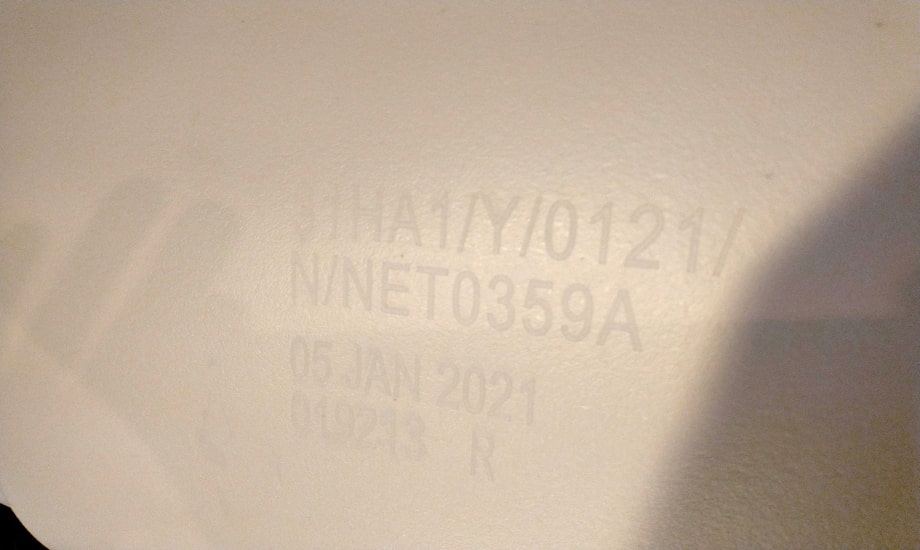
Knock Down Drums (KDD) for Remote Locations
Greif’s Knock Down Drums (KDD) offer the optimal sustainable solution for transporting steel drums to remote locations. Semi-finished drum parts are shipped and assembled locally on site with minimum people and equipment. The unique concept allows transportation of up to 1,176 KDDs in a 20’ sea container compared to 80 full finished drums, saving valuable space, optimizing transport costs and minimizing our customers' carbon footprint during longer transit times. Drums are delivered directly to our customers' filling station helping to improve efficiencies with minimum stock and less manual handling..
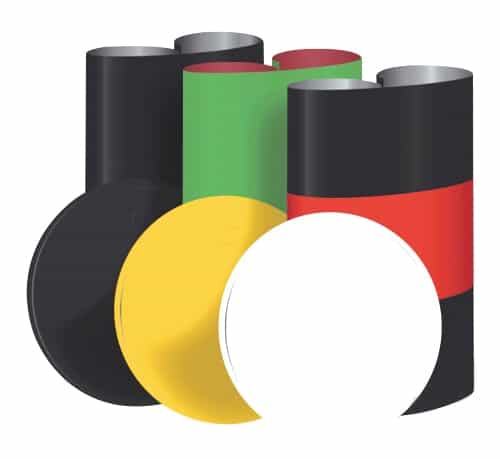
Lightweighting and Innovating the Shape of Jerrycans
Greif manufactured our first lighter weight 20 and 25-liter jerrycan models in 2015. This design is 15 percent lighter than the previous model while maintaining performance specifications of the previous design. Due to the reduced weight, the new jerrycans reduce materials and energy used in production by up to 15 percent and have a reduced emissions impact. In 2019, we expanded this product line to include sizes 16 and 18 liters. We now produce our lighter jerrycans in Italy, Israel, Sweden and Singapore.
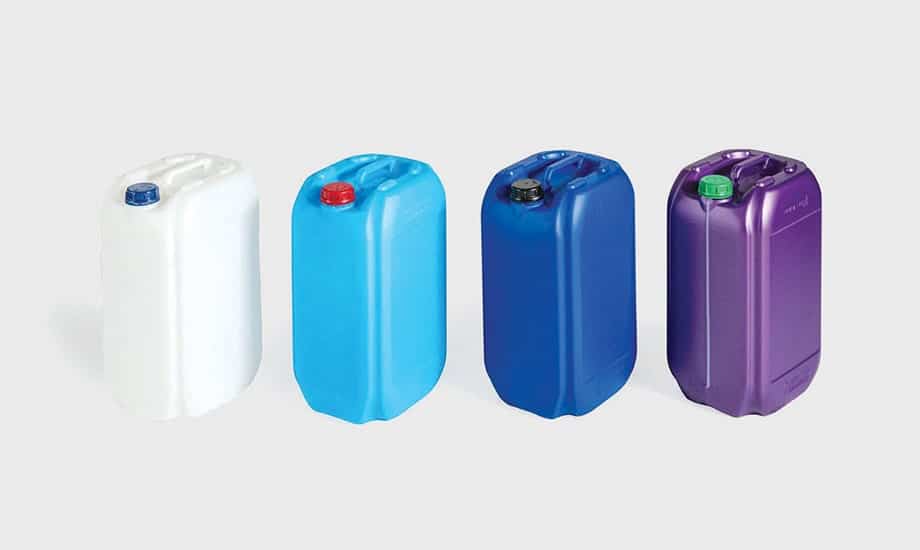
ECOEX Jerrycans
COEX multilayer plastic packaging combines several layers of different plastics materials into a single structure and offers many barrier performance benefits, particularly for agrochemical and food packaging applications. However, when reground, COEX plastics can only be used in low performance applications. In response to our customers’ need for recyclable packaging with superior barrier performance, we created our ECOEX line of jerrycans. The ECOEX technology enables Greif to produce an innovative, multilayer jerrycan that can be recycled through regrinding processes to produce high performing, UN Certified jerrycans and bottles. ECOEX also reduces costs for our customers who typically pay an increased collection fee for COEX packaging collection after use. We continue to drive innovation that supports our circular economy strategy and meets our customers’ needs. The LATAM GIP team was awarded the 2021 Michael J. Gasser Sustainability Award for their contribution towards our circular economy strategy while meeting the needs of our customers.
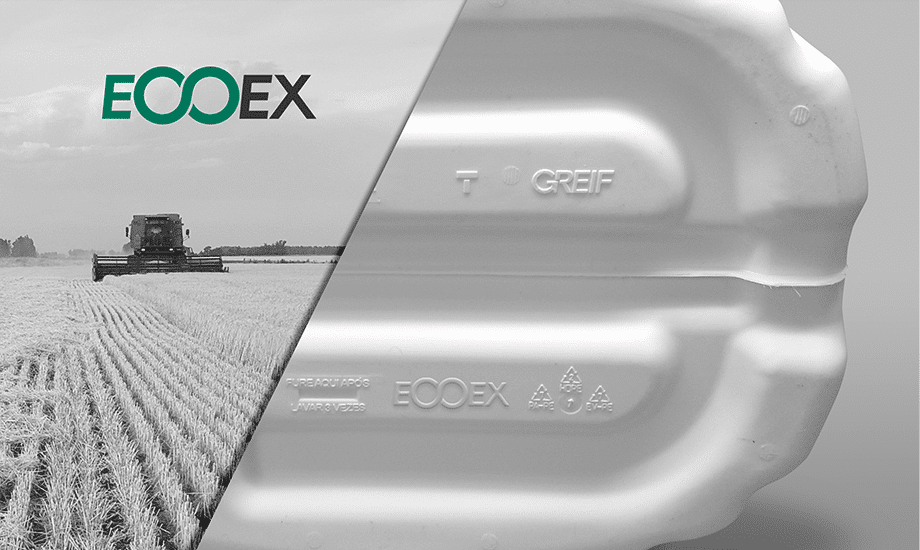
EasyPour Concrete Forming Tubes
Greif’s high-quality 100% recycled paperboard concrete forming tubes offer superior performance for demanding concrete projects including columns, footings, piers and other structures. EasyPour tubes are one example of our efforts throughout 2021 to commercialize new product lines that replace virgin-based products with recycled material products and remove plastic by incorporating our aqueous-based barrier coatings. EasyPour tubes also provide our customers with products that have improved end-of-life solutions, thereby advancing our circular economy strategy. EasyPour’s built-in weather shield technology provides moisture resistance and increased strength and durability. EasyPour tubes are LEED® qualified, made of 100% recycled paperboard produced by Greif mills and are fully recyclable and repulpable.
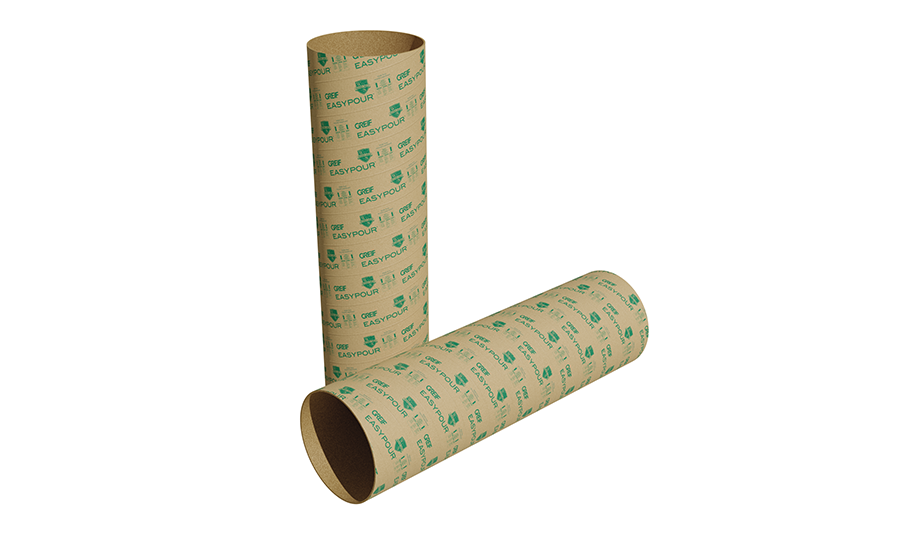
A Lighter Approach
In order to respond to customer demands to remove weight and optimize transportation costs, our Greif Latin America colleagues designed a novel plastic drum innovation using a never seen before facetted side-wall approach for large plastic drums. This improvement removed up to 14 percent of the resin in the drum while maintaining performance. Not only does the design reduce raw material usage, it also optimized pallet utilization due to its unique configuration which allows more drums to be transported in the same space as the legacy design. The faceted drum is a more sustainable solution both in reducing natural resource consumption and lowering fossil fuel-based raw material usage and CO2 emissions during transportation.
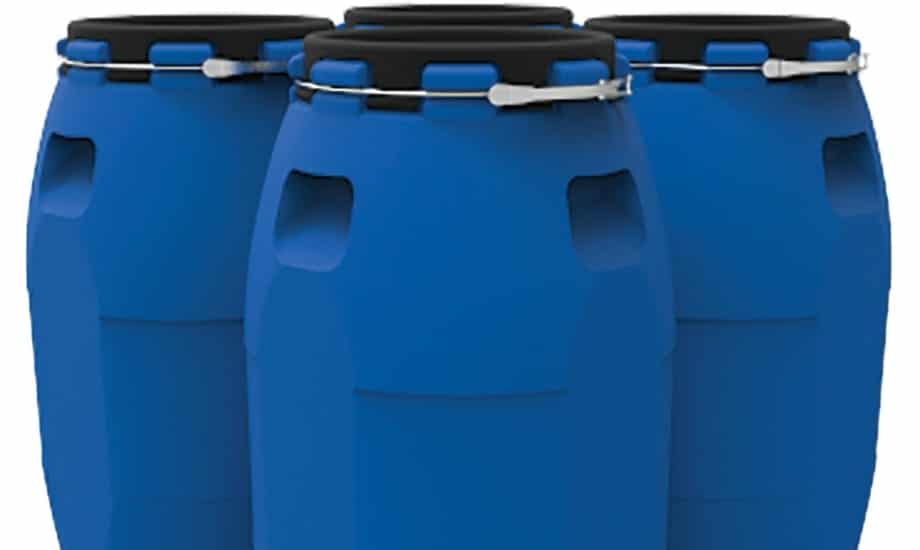
Better Branding with Drum 360
At Greif, we now have the ability to print high-resolution images directly onto steel drums using the latest print technologies. This capability is the direct result of an investment designed to meet the needs of customers who are looking for ways to differentiate their products and generate impactful packaging design to support the price point of high value products. In addition to adding value for our customers, this process eliminated the need for a standard gas oven, using LED-based UV curing during the production process. This new process saves 0.5 kilograms CO2 per drum. Greif strategically placed the new Drum 360 technology in plants close to customers who use this new technology, in the Belgium, France, Netherlands, Italy, Germany and Poland.
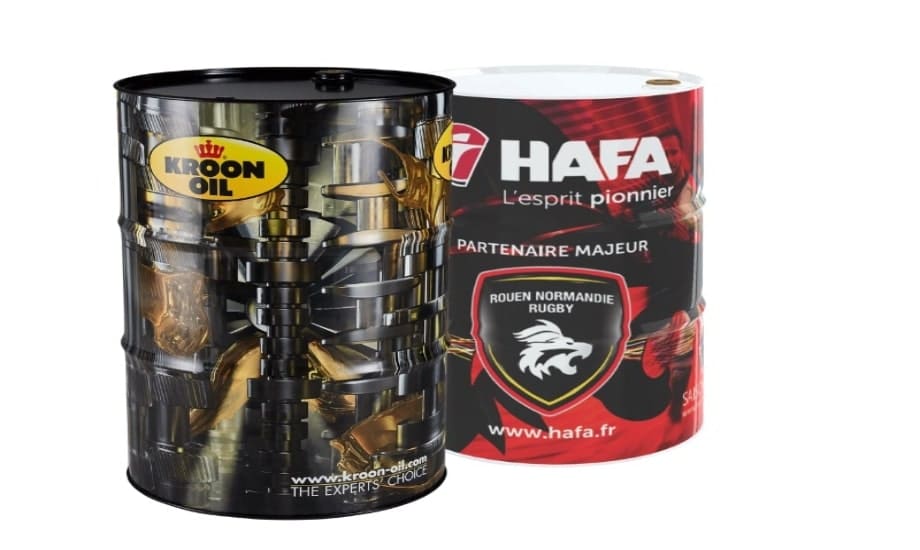
GCUBE Connect: Real-time Tracking for your IBCs
Greif’s GCUBE Connect solution, launched at LogiChem virtual conference, gives real time tracking information about a customer’s IBC through the application of an Internet of Things-based device. A customer-based dashboard displays in real time where an IBC is sited, the level of the filled product and the environmental temperature. This dashboard allows customers to plan in advance for deliveries of filled product and the arrival of new IBCS, as well as schedule collections of empty IBCs. GCUBE Connect also supports better management of residue in the IBCs. Each IBC that enters the facility is automatically weighed to determine how much residue is in the container to determine how it will be treated. This innovation pairs well with Greif France’s ability to pick up and drop off reconditioned IBCs from any site along a customer’s supply chain, as opposed to one single location. Together, they simplify the logistics for the customer and increase transparency.
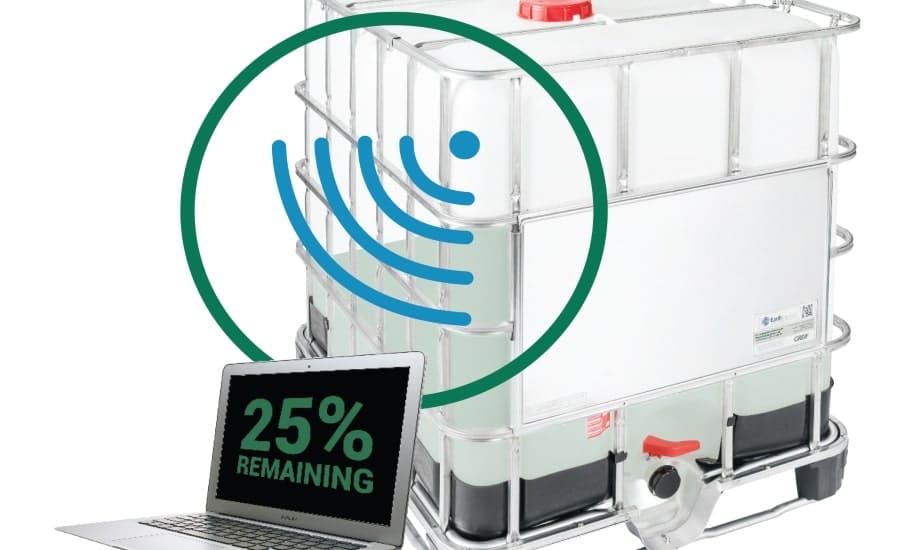
Meeting Consumer Demand for More Sustainable Packaging
Consumer demand for sustainable food and beverage packaging is increasing demand for more sustainable products. Our PPS business works with customers and partners to develop innovative products that replace virgin-based products with recycled material products or products that replace plastic from packaging with our barrier coatings. We developed the EnviroBevTM beverage carrier to replace a virgin-based product with a 100% recycled, wet-strength material for craft brewery beverage carriers. In 2021, PPS also commercialized food grade packaging—cupstock, platestock and bowls—made from recycled fiber with an aqueous-based coating. This coating replaces the polyethylene extrusion typically used in food grade packing and enables the packaging to be more readily composted or recycled. Combined, these innovations will replace 14,000 tons of virgin-based material with recycled material. The PPS innovation team was awarded the 2021 Michael J. Gasser Sustainability Award for their contribution towards our circular economy strategy while meeting the needs of our customers.
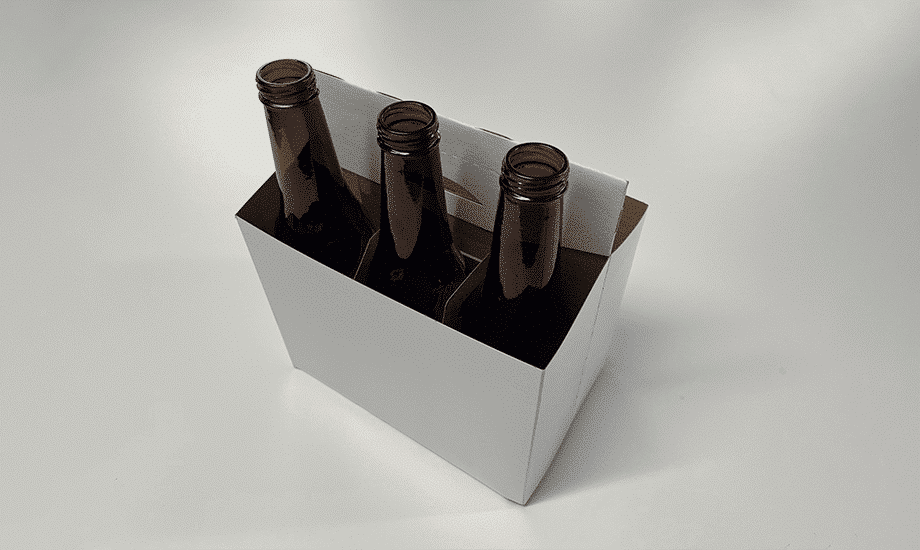
SUSTAINABILITY HIGHLIGHTS
$872 M
Revenue From Sustainability-Tagged Products
In 2021, Greif had $872,376,716 in revenue from sustainability-tagged products for Greif's GIP business unit.
100%
Facilities Compliant With ISO Food Manufacturing Standards in NA
Through our Food Safety Initiative we are working to maintain our position as a market leader in food safety and meet emerging compliance requirements.






